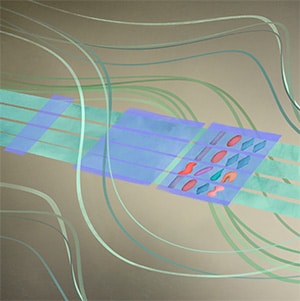Cancer screenings are key to saving lives. Take colonoscopies, for example, which are estimated to reduce colorectal cancer risk by about 30%. This is because undergoing colonoscopies as recommended (every 10 years beginning at age 45 for those at average risk) gives physicians the chance to detect and remove precancerous growths called adenomas (a type of polyp) before they can turn into colorectal cancer.
But individuals with a history of adenomas continue to have an increased risk of colorectal cancer, even after they’re removed, in part because the removed adenomas often return. Researchers, therefore, are looking for additional ways to intercept colorectal cancer—in other words, stop precancerous cells in their tracks before they become cancerous.

One approach is to use vaccination to train the patient’s immune system to recognize and respond to cellular changes associated with cancer. Research from Olivera Finn, PhD, a distinguished professor of immunology and surgery at the University of Pittsburgh, suggests that a vaccine that triggers immune responses to a protein called MUC1 could be a promising strategy to prevent colorectal cancer.
MUC1 is found on the surface of cells lining the colon and rectum and is responsible for producing mucus and activating certain cellular signaling pathways. While it is found on healthy (noncancerous), precancerous, and cancerous cells, the sugar molecules bound to MUC1 adopt a unique pattern in precancerous and cancerous cells. To spare healthy cells, the experimental vaccine developed by Finn and colleagues trains immune cells to recognize MUC1 proteins with the precancer- and cancer-associated sugar patterns, allowing them to eradicate these cells before they can form either a precancerous adenoma or a cancerous tumor.
In 2013, Finn and colleagues reported in the American Association for Cancer Research (AACR) journal Cancer Prevention Research that their experimental MUC1-targeted vaccine was safe and induced long-lasting MUC1-specific immune responses in 17 of 39 vaccinated patients who had a history of advanced adenomas and who received the vaccine as part of a phase I/II clinical trial. For the 22 patients who did not develop a response to the vaccine, immune analyses suggested that preexisting immune-suppressing cells may have hindered the vaccine’s effectiveness.
Reducing the Risk of Polyp Recurrence
Based on these results, Finn and colleagues tested the ability of their vaccine to prevent adenoma recurrence in a phase III clinical trial. As reported in 2023 in the AACR journal Clinical Cancer Research, of the 11 patients who developed vaccine-induced immune responses, eight benefited from it, while three (27%) had an adenoma recurrence. In comparison, 31 of 47 (66%) patients who received a placebo treatment had adenoma recurrence. This represents a 38% absolute reduction in risk of redeveloping these polyps with vaccination. The reduction was not statistically significant, but the researchers suggested that adjustments to the timing of vaccination and strategies to counter immune-suppressing cells around the target cells could improve the vaccine’s efficacy. In addition to colorectal cancer, the vaccine is also being tested to prevent breast cancer.
Future studies to develop interception strategies for colorectal cancer will benefit from a deeper understanding of how normal tissue evolves to precancer and cancer. In three recent publications, researchers reported new insights into colorectal cancer development. The studies are a part of a collection published in Nature journals by the Human Tumor Atlas Network, a Cancer Moonshot initiative supported by the National Cancer Institute that is using cutting-edge tools to understand the molecular changes that occur as cancer forms.
In the studies focused on colorectal cancer, researchers identified that changes to the regulation of gene expression, protein-protein interactions, cellular metabolism, hormone levels, immune responses, and other processes are associated with the formation of precancerous adenomas and cancerous tumors. They also found that as colorectal cancer cells spread to other parts of the body, they start to lose the features characteristic of colorectal cells and become increasingly like stem cells that do not have a particular identity. These studies provide new resources and insights for researchers that could help them uncover novel targets and strategies for colorectal cancer detection and interception.
Researchers continue to develop new strategies to detect and intercept cancer. Learn more about ongoing efforts in an AACR interview with leading cancer researchers.
The post Can a Vaccine Prevent Colorectal Cancer? appeared first on American Association for Cancer Research (AACR).



